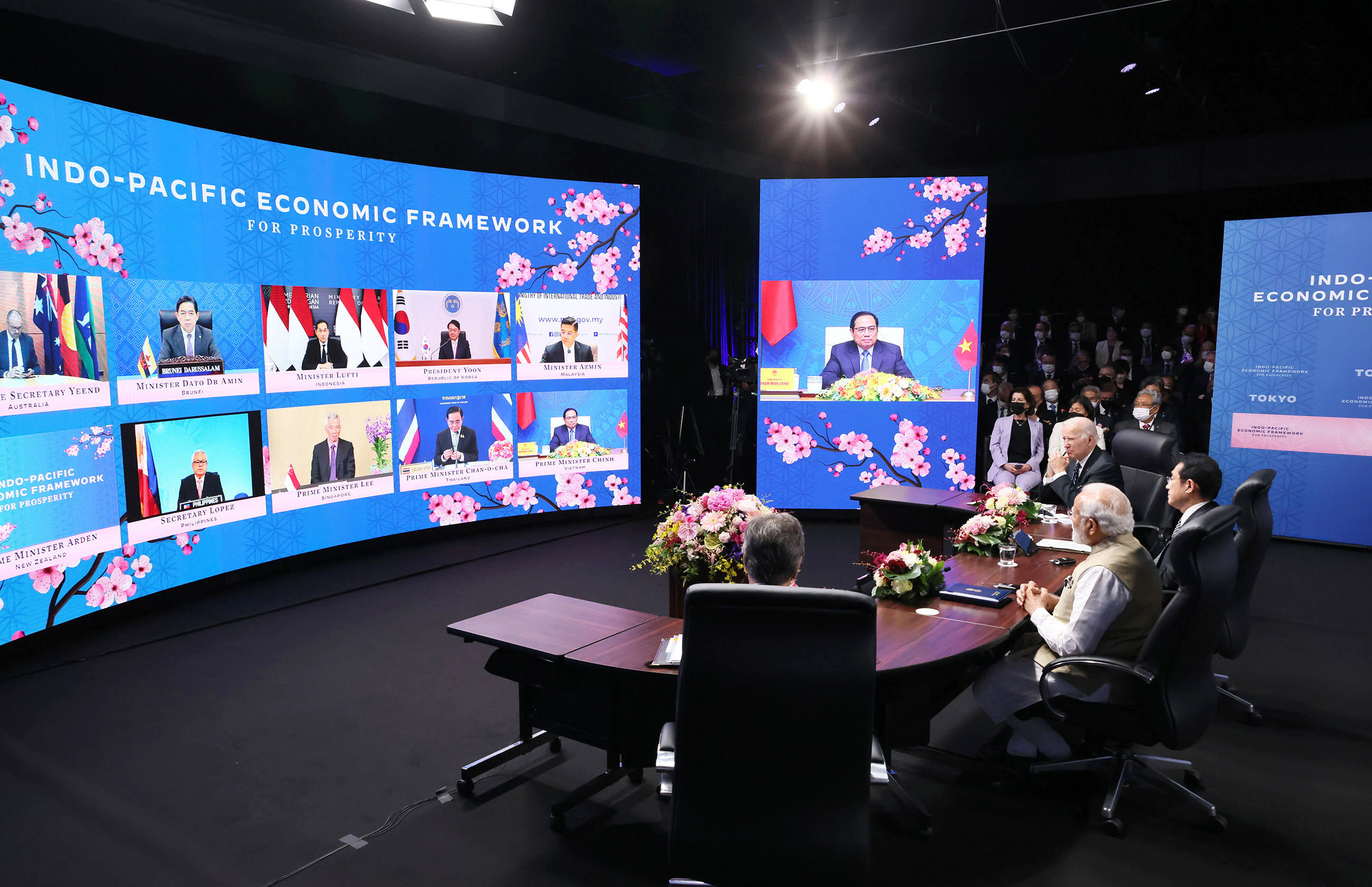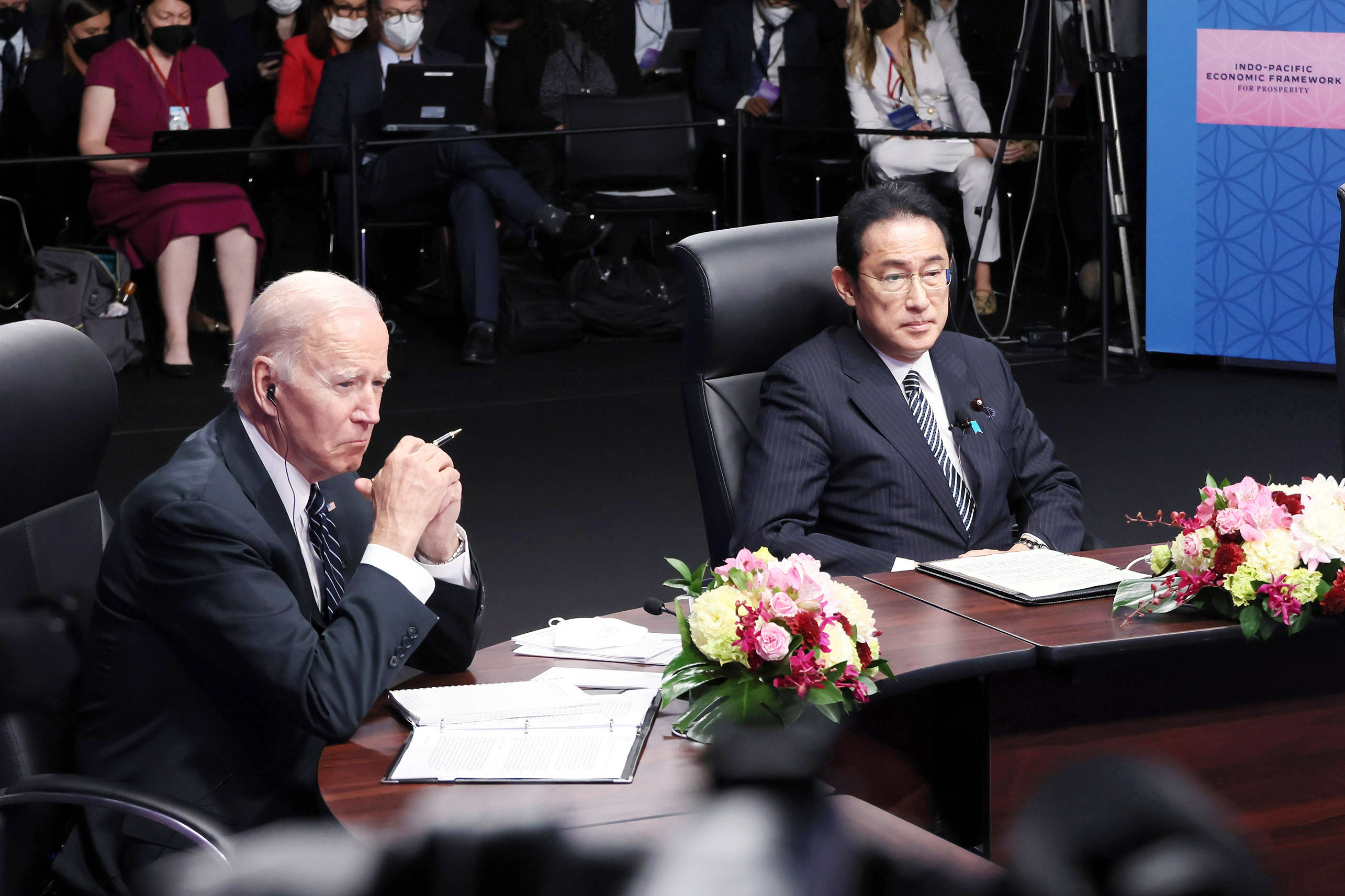Indo-Pacific Economic Framework on:
[Wikipedia]
[Google]
[Amazon]
Indo-Pacific Economic Framework for Prosperity (IPEF) is an economic initiative launched by United States President Joe Biden on May 23, 2022. The framework launched with a total of fourteen participating founding member nations, with the late entry of Fiji, the first South Pacific Island to join, with an open invitation for other countries to join at any time.

 Biden described the initiative as "writing the new rules for the 21st century economy", stating that the agreement would make the participant's economies "grow faster and fairer".
Biden described the initiative as "writing the new rules for the 21st century economy", stating that the agreement would make the participant's economies "grow faster and fairer".

 Biden described the initiative as "writing the new rules for the 21st century economy", stating that the agreement would make the participant's economies "grow faster and fairer".
Biden described the initiative as "writing the new rules for the 21st century economy", stating that the agreement would make the participant's economies "grow faster and fairer". Commerce Secretary
The United States secretary of commerce (SecCom) is the head of the United States Department of Commerce. The secretary serves as the principal advisor to the president of the United States on all matters relating to commerce. The secretary rep ...
Gina Raimondo argued that the framework constituted "the most significant international economic engagement that the United States has ever had in this region". Analysts have compared it to the Trans-Pacific Partnership
The Trans-Pacific Partnership (TPP), or Trans-Pacific Partnership Agreement, was a highly contested proposed trade agreement between 12 Pacific Rim economies, Australia, Brunei, Canada, Chile, Japan, Malaysia, Mexico, New Zealand, Peru, Singa ...
which the United States withdrew from in 2017.
The initiative is intended to be a precursor for later negotiations, as it does not include a uniform lowering of tariff
A tariff is a tax imposed by the government of a country or by a supranational union on imports or exports of goods. Besides being a source of revenue for the government, import duties can also be a form of regulation of foreign trade and poli ...
s.
The four themes of the proposed IPEF are:
# Fair and resilient trade
# Supply chain resilience Supply chain resilience is "the adaptive capability of the supply chain to prepare for unexpected events, respond to disruptions, and recover from them by maintaining continuity of operations at the desired level of connectedness and control over st ...
# Infrastructure, clean energy, and decarbonization
# Tax and anti-corruption
Anti-corruption (or anticorruption) comprises activities that oppose or inhibit corruption. Just as corruption takes many forms, anti-corruption efforts vary in scope and in strategy. A general distinction between preventive and reactive measu ...
Participating nations
IPEF has fourteen member states and represents 40% of world GDP. * * * * (partly opted out on the trade pillar) * * * * * * * * * *Reactions
Chinese Foreign Minister
The Minister of Foreign Affairs of the People's Republic of China (; ''Zhōnghuá Rénmín Gònghéguó Wàijiāobù Bùzhǎng'') is the head of the Ministry of Foreign Affairs of the People's Republic of China and one of the country's most imp ...
Wang Yi criticized the initiative as an attempt to further economic decoupling from China. Wang Yi argued that the initiative, and the US Indo-Pacific
The Indo-Pacific is a vast biogeographic region of Earth.
In a narrow sense, sometimes known as the Indo-West Pacific or Indo-Pacific Asia, it comprises the tropical waters of the Indian Ocean, the western and central Pacific Ocean, and the ...
strategy as a whole, created divisions and "incited confrontation". Wang stated that such an agreement would "ultimately be a failure".
Many analysts have criticized the lack of inclusion of Taiwan
Taiwan, officially the Republic of China (ROC), is a country in East Asia, at the junction of the East and South China Seas in the northwestern Pacific Ocean, with the People's Republic of China (PRC) to the northwest, Japan to the nort ...
in the framework, with '' Taiwan News'' calling the lack of inclusion a "snub". An opinion piece published in '' The Hill'' asserted that Taiwan was excluded in order to appease key "fence-sitter" countries such as Indonesia
Indonesia, officially the Republic of Indonesia, is a country in Southeast Asia and Oceania between the Indian and Pacific oceans. It consists of over 17,000 islands, including Sumatra, Java, Sulawesi, and parts of Borneo and New Guine ...
whose governments feared angering China.
Former Malaysian Prime Minister
The prime minister of Malaysia ( ms, Perdana Menteri Malaysia; ms, ڤردان منتري مليسيا, label=Jawi alphabet, Jawi, script=arab, italic=unset) is the head of government of Malaysia. The prime minister directs the executive branc ...
Mahathir Mohamad
Mahathir bin Mohamad ( ms, محاضير بن محمد, label= Jawi, script=arab, italic=unset; ; born 10 July 1925) is a Malaysian politician, author, and physician who served as the 4th and 7th Prime Minister of Malaysia. He held the office ...
criticized the grouping as an initiative intended to isolate China, saying "many countries recognize that this is not an economic grouping but it is truly a political grouping."
Indian Position
The Indo-Pacific Economic Framework is relied on four pillars namely tax, anti-corruption, clean energy and data and privacy. So far, India has agreed to three pillars relating to supply chains: tax, anti-corruption and clean energy, but the fourth pillar on data and privacy is yet to be completely agreed upon. Prabir De of theResearch and Information System for Developing Countries
Research is "creativity, creative and systematic work undertaken to increase the stock of knowledge". It involves the collection, organization and analysis of evidence to increase understanding of a topic, characterized by a particular att ...
, a think tank of the MEA, wrote that India may be uncomfortable with the US high standards, and would like to avoid risks. He further added, “Some areas proposed in the IPEF do not appear to serve India’s interests. For example, the IPEF talks about digital governance but the IPEF formulation contains issues that directly conflict with India’s stated position.”, Minister of Commerce & Industry Piyush Goyal also said at the press conference that India was in the process of firming up its own digital framework and laws, particularly regarding privacy and data, and it would wait for more information. In the meantime, officials will be participating in the discussions “with an open mind”.
Comparison with RCEP
The Indo-Pacific Economic Framework would "outweigh" in both population andgross domestic product
Gross domestic product (GDP) is a money, monetary Measurement in economics, measure of the market value of all the final goods and services produced and sold (not resold) in a specific time period by countries. Due to its complex and subjec ...
the Regional Comprehensive Economic Partnership. The only RCEP members not also included in the IPEF are China, Myanmar, Cambodia, and Laos; while non-RCEP members are the United States, India, and Fiji.
References
{{reflist International economic organizations 2022 establishments in the United States Organizations established in 2022